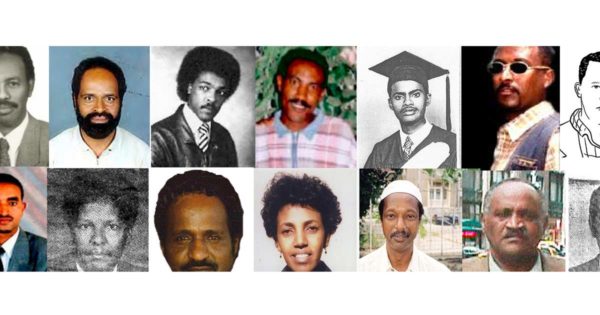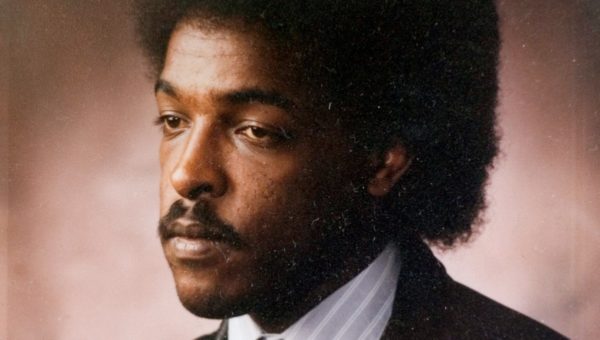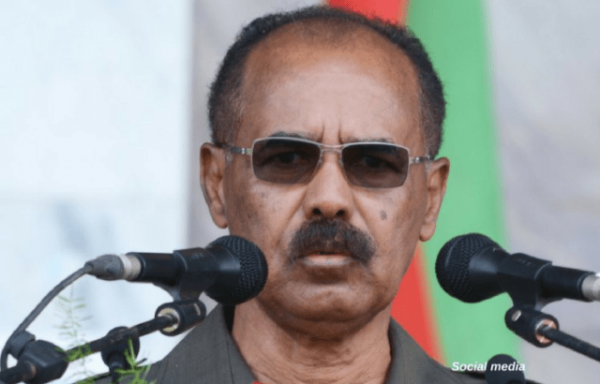 From our Correspondent
From our Correspondent
Makeda Saba
Somwhere in Eritrea, 4th November 2020
In Eritrea in 2001, members of the only political party the People’s Front of Democracy and Justice (PFDJ), known as the G15, openly questioned the practices and policies of the party. The nascent national independent media played a vital role in the discussion by publishing editorials, comments as well as letters exchanged between the members of the G15 and President Isaias Afwerki.
The Eritrean President responded to the criticism and the ongoing media debate by closing all the independent media and arresting all the journalists and editors associated with it. The justification for the arrests is that they are all criminals and traitors guilty of conspiring with the enemies of the country (i.e. Ethiopia).
Specifically, in the case of the journalists, the arrest was not in compliance with provisions of the Press Proclamation (1996) as there was no court order for the arrest nor was there a declared state of emergency. No court of law heard their case. The arrest of the journalists was an action taken outside of the judicial systems. Hence, it was an act outside of the rule of law with the sole purpose of silencing the media and restricting freedom of speech. To date, in Eritrea, there is no independent National Media.

In 2001, the Eritrean Government arrested the following journalists:
Yosef Mohamed Ali, Chief Editor of Tsigenay;
Seyoum Tsehaye, Freelance Editor and photographer and former Director of Eritrean State Television (ETV);
Temesgen Gebreyesus, Reporter for Keste Debena;
Mattewos Habteab, Editor of Meqaleh;
Dawit Habtemicheal, Assistant Chief Editor, Meqaleh;
Medhanie Haile, Assistant Chief Editor, Keste Debena;
Fessahye Yohannes (i.e Joshua) a reporter and co-owner of Setit;
Said Abdulkadir, Chief Editor of Admas;
Amanuel Asrat, Chief Editor of Zemen;
Dawit Isaak, a reporter and co-owner of Setit;
Hamid Mohammed Said, ETV;
Amanuel Asrat, Chief Editor of Zemen;
Hamid Mohammed Said, ETV;
Saleh Aljezeeri, Eritrean State Radi0;
Zemenfes Haile, founder and manager of the private weekly Tsigenay;
Ghebrehiwet Keleta, a news writer for Tsigenay,
Selamyinghes Beyene, a reporter for the weekly MeQaleh;
Binyam Haile of Haddas Eritrea;
Simret Seyoum, a writer and general manager for Setit.
Three of the journalists arrested in 2001 have received International recognition for their work. Seyoum Tsehaye was nominated journalist of the year in 2007; Dawit Isaak was, awarded the Golden Pen of Freedom in 2011, and in 2017 the UNESCO/Guillermo Cano World Press Freedom Prizev. This year, Amanuel Asrat was, awarded the International Writer of Courage award. During a 2001 BBC interview discussing the arrests Mr Yeamane Grebremeskelvii, confirmed the Government’s view that, the journalists were involved in illegal activities endangering the security and the sovereignty of Eritrea. However, he was not able to specify the charges or which Government entity would be responsible for their case. A reliable source reports that the Government never formally charged the journalist nor were they brought to trial. Since then the Government has continued to arrest and disappear journalists arbitrarily. It has also ensured that the archived collections of the independent papers are not readily available for scrutiny.
The Government of Eritrea has effectively silenced Eritreans. An action that is contrary to the provisions of Article 19 of the Universal Declaration of Human Rights (UDHR); Article 19 of the International Convention on Civil and Political Rights (ICCPR); Article 9 of the African Charter of Human and Peoples Rights (ACHPR); and Article 19 of the 1997 Eritrean Constitution that the Government has failed to implement.
Concerned about the Eritrean Government’s restriction of freedom of speech, the international organisation Article 19 presented the case of the arrested Eritrean journalist and the members of the G15 to the African Commission of Human and People’s Rights. Upon reviewing the case, the Commission concluded that the Eritrean Government had violated the right of freedom of expression and that the general restriction of human rights and in particular :
“………the right to free expression and to freedom from arbitrary arrest and detention serves only to undermine public confidence in the rule of law. “
The African Commission of Human Rights was also of the opinion that:
“…..The legitimate objective of safeguarding and indeed strengthening national unity under difficult political circumstances cannot be achieved by attempting to muzzle advocacy, multi-party democracy, democratic tenets and human rights.”
Therefore, the Commission directed the Eritrean Government to:
“…………release or to bring to a speedy and fair trial the 18 journalists detained since September 2001, and to lift the ban on the press; Recommends that the detainees be granted immediate access to their families and legal representatives, and recommends that the government of Eritrea takes appropriate measures to ensure payment of compensation to the detainees.”

The case of Eritrean journalist Dawit Isaak was brought before the African Commission of Human and People’s Rights, on the 29th October 2012. Dawit is one of the journalists arrested and disappeared by the Eritrean Government in 2001. In considering the case, the Commission noted that the Eritrean Government had taken no action to implement its previous direction regarding the arrest and disappearance of Dawit Isaak and other journalists:
“The Commission observes therefore that the rights and obligations of the parties were duly determined in Article 19 v Eritrea. The Commission also notes that the present Communication is consequent to the Respondent State’s failure to implement its decision, which has led to the Complainant being held incommunicado for about 13 years now. The Commission regrets this state of affairs and would like to draw the Respondent State’s attention to its obligation to give effect to the rights and freedoms enshrined in the Charter which it voluntarily undertook to adhere to.”
In conclusion, the Commission reaffirmed the directions it had given in the case of Article 19 – v – the State of Eritrea. Specifically, it directed that the Government should:
“a. release or bring to a speedy and fair trial the 18 journalists (including Mr Dawit Isaak) detained since September 2001, and to lift the ban on the press;
b. grant detainees immediate access to their families and legal representative; and
c. take appropriate measures to ensure payment of compensation to the detainees; …”
To date, the Eritrean Government has taken no action to implement the directions of the African Commission of Human and People’s Rights. And, the families of the journalist have no idea as to their whereabouts or as to their health.
Though the case of all of the journalists arrested and disappeared by the Eritrean Government is dire and disturbing, the situation of Dawit Isaak is unique as he is a dual Swedish and Eritrean citizen. He was one of the founders of the independent newspapers the Setit. In 2001, Setit published an open letter, from the dissenting Eritrean Government members known as G15 to President Isaias Afwerki. This publication generated much public debate and discussion in the local media. A lively exchange that resulted in the Government arrest of the eleven members of the G15, and the journalists. Dawit, as already stated, was one of the journalists arrested.
As Dawit is also a Swedish citizen, the Sweedish Government has made numerous diplomatic approaches to the Eritrean Government to secure his release. In 2009, the EU Development Minister Louis Michael received firm assurances from Eritrean Diplomats as to the possibility of the release of Dawit Isaak into his care. On the strengths of such assurances, the Minister travelled to Asmara. The Eritrean Government did not release Dawit, and the Minister was not allowed to see him.
As Dawit is an EU citizen, his case has come to the attention of the European Parliament. Hence in 2011, the Parliament issued its first resolution calling for his release. The resolution states that as Dawit is an EU citizen, the EU has a legal and moral obligation to protect his interests as per the European Convention of Human Rights. The resolution also expresses concern that Dawit had already spent ten years in prison without being charged or a trial. The European Parliament also expressed its shock at the Eritrean Government’s refusal to provide any information as to Dawit’s well being. Since then there have been two additional European Parliament Resolutions addressing the deteriorating human rights situation in Eritrea, and calling for the release of Dawit Isaak; journalists as well as other prisoners of conscience such as the members of the G15.
The Eritrean Government’s reaction to this years European Parliament’s resolution calling for the release of Dawit Isaak is to express outrage. The Eritrean Ministry of Information editorial, echoing the Government’s official response describes the Parliament’s claims as to Dawit’s incarceration and the deterioration of human rights in the country as: “.. utterly false ….”. The Minister of Information Twitts:”Eritrea categorically rejects the European Parliament Resolution which is utterly unfounded in substance and malicious in intent.”
Officially, the Eritrean Government is of the view that the European Parliament’s 2020 resolution is an attack on Eritrea and it is a rehash of the “…fallacious reports of the UNHRC Special Rapporteur on Eritrea.” It responds that as Dawit is guilty of”..treasonous acts..”, his case “…cannot be misconstrued as an issue of human rights and freedom of expression…”. Therefore, implying that prisoners like Dawit have no human rights. The response strongly objects to paragraph 8 of this years European Parliament’s resolution. The paragraph requires the Commission to evaluate:
“…the tangible outcomes regarding human rights that have resulted from the EU-Eritrea strategy and the so-called ‘dual-track approach'”; the resolution also requires the Commission to ensure that the “….conditionality of EU aid is respected…”
In response, the Eritrean Government states that: “.. Eritrea is not a party to an agreement with the EU predicated on ‘dual-track’ approach and that stipulates conditionalities that corrode its sovereign political choices and decisions. Eritrea understands that the multilateral development cooperation with the EU is governed by the Cotonou Agreement. .”
The statement as to the Eritrean Governments understanding of the dual-track approach is not true. On the 28th of January 2016, the Government of Eritrea and the European Union signed the 11th European Development Fund – National Indicative Programme 2014 -2020 (NIP 2014-2020). The Programme allocated EUR 175 Million for Sustainable Energy; and EUR 25 Million for Governance. By 2019, much of the NIP was uncommitted. Hence in March of that year, taking into account the recently signed peace agreement between Ethiopia and Eritrea, the European Development Fund Committee (EDFC), unanimously approved the transfer of EUR 180 Million from the NIP (2014-2020) to the EU Emergency Trust Fund for Africa (EUTF). The decision amended the NIP, changing the focus of EU funding to road construction and rehabilitation. The justification for the action was that it would allow the necessary flexibility to resume a significant political dialogue with Eritrea while at the same time reinforcing the Ethiopia Eritrea peace process. A dual-track approach. Such change could not happen without the knowledge and the consent of the Eritrean Government.
On the issue of applicable conditionalities, the Eritrean Government should remember that the critical elements of engagement as pe the Cottonau Agreement are human rights, democratic principles and the rule of law. All issues rightly raised in all of the European Parliament’s resolution on Dawit Isaak.
The Government of Eritrea has not released any of the journalists, the G15 members or any other prisoner of conscience. The families of the prisoners have no access, and they have no information as to the well being of their loved one’s. Finally, it has not released Dawit Isaak, and it is nineteen years that his family has not seen him and has no news. His children have grown without ever seeing their father, unimaginable cruelty that the State of Eritrea continues to perpetrate against the family.

Despite the efforts of the Eritrean Government, information about its prisoner’s leaks. Many of the disclosures are from guards and other Government officials who have escaped. Unfortunately, the reports are that a number of the journalist arrested in 2001 have died as a result of mistreatment, neglect and torture. Based on the eye witness accounts, Eritrean Human Rights Activists have compiled a list of ‘Political Prisoners, Prisoners of Conscience and other Forcibly Disappeared Citizens in Eritrea (1991-2020)’.
Still, the information is not complete. The absence of a body, the inability to perform funeral rites all mean that families cannot mourn their loved ones. Though the Eritrean Government is not, like the Dergue, demanding the payment for the bullets that kill our loved ones, it is nevertheless extracting from families and all of us its pound of flesh and suffering. In this manner, the journalist, their families and the people of Eritrea are in prison. Collective punishment.
Remembering is an act of defiance. Talking and sharing our stories is an act of defiance. Hence, we remember, we tell our stories and stand in solidarity with Dawit Isaak and his family. The fight for the release of Dawit Isaak, and through him for the release of all Political Prisoners, Prisoners of Conscience and Other Forcibly Disappeared Persons continues and is getting stronger.
The latest effort for the release of Dawit is the Swedish court action started on the 21st of October by Reporters Without Borders (RSF). The court action is against President Isaias Afworki and seven senior Eritrean Government officials. Reporters Without Borders have filed a complaint for crimes against humanity, enforced disappearance, torture and kidnapping.
We remember.
Makeda Saba
makedasaba@gmail.com
